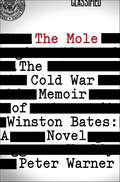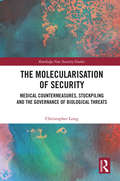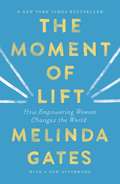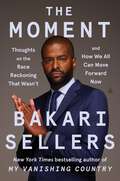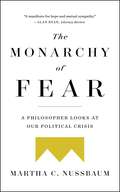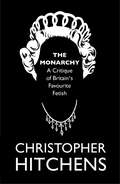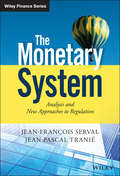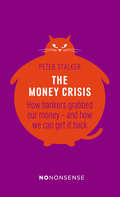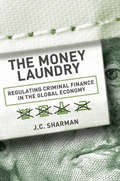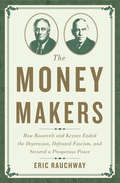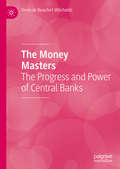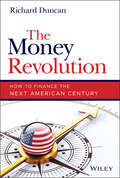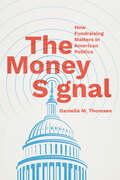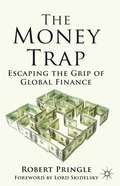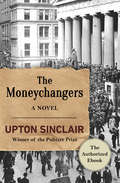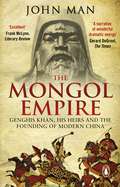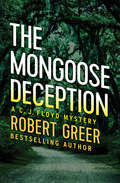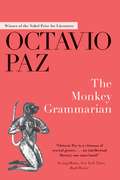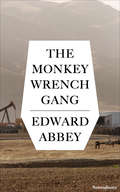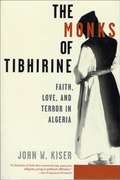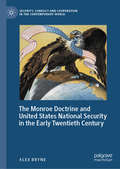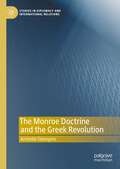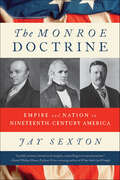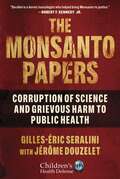- Table View
- List View
The Mole: The Cold War Memoir of Winston Bates: A Novel
by Peter WarnerThe fictitious memoir of an unlikely foreign spy planted in Washington, D.C., in the years after World War IIRecruited by a foreign power in postwar Paris and sent to Washington, Winston Bates is without training or talent. He might be a walking definition of the anti-spy. Yet he makes his way onto the staff of the powerful Senator Richard Russell, head of the Armed Services Committee. From that perch, Bates has extensive and revealing contacts with the Dulles brothers, Richard Bissell, Richard Helms, Lyndon Johnson, Joe Alsop, Walter Lippman, Roy Cohn, and even Ollie North to name but a few of the historical players in the American experience Winston befriends—and haplessly betrays for a quarter century.A comedy of manners set within the circles of power and information, Peter Warner's The Mole is a witty social history of Washington in the latter half of the twentieth century that presents the question: How much damage can be done by the wrong person in the right place at the right time?Written as Winston's memoir, The Mole details the American Century from an angle definitely off center. From Suez, the U-2 Crash, the Bay of Pigs, Vietnam, and Watergate, the novel is richly and factually detailed, marvelously convincing, and offers the reader a slightly subversive character searching for identity and meaning (as well as his elusive handler) in a heady time during one of history's most defining eras.
The Molecularisation of Security: Medical Countermeasures, Stockpiling and the Governance of Biological Threats (Routledge New Security Studies)
by Christopher LongThis book investigates the way that the molecular sciences are shaping contemporary security practices in relation to the governance of biological threats. In response to biological threats, such as pandemics and bioterrorism, governments around the world have developed a range of new security technologies, called medical countermeasures, to protect their populations. This book argues that the molecular sciences’ influence has been so great that security practices have been molecularised. Focusing on the actions of international organisations and governments in the past two decades, this book identifies two contrasting conceptions of the nature or inherent workings of molecular life as driving this turn. On the one hand, political notions of insecurity have been shaped by the contingent or random nature of molecular life. On the other, the identification of molecular life’s constant biological dynamics supports and makes possible the development and stockpiling of effective medical countermeasures. This study is one of the few to take seriously the conceptual implications that the detailed empirical workings of biotechnology have on security practices today. This book will be of much interest to students of security studies, bio-politics, life sciences, global governance, and International Relations in general.
The Moment of Lift: How Empowering Women Changes the World
by Melinda French GatesNEW YORK TIMES BESTSELLER“In her book, Melinda tells the stories of the inspiring people she’s met through her work all over the world, digs into the data, and powerfully illustrates issues that need our attention—from child marriage to gender inequity in the workplace.” — President Barack Obama“The Moment of Lift is an urgent call to courage. It changed how I think about myself, my family, my work, and what’s possible in the world. Melinda weaves together vulnerable, brave storytelling and compelling data to make this one of those rare books that you carry in your heart and mind long after the last page.” — Brené Brown, Ph.D., author of the New York Times #1 bestseller Dare to Lead “Melinda Gates has spent many years working with women around the world. This book is an urgent manifesto for an equal society where women are valued and recognized in all spheres of life. Most of all, it is a call for unity, inclusion and connection. We need this message more than ever.” — Malala Yousafzai "Melinda Gates's book is a lesson in listening. A powerful, poignant, and ultimately humble call to arms." — Tara Westover, author of the New York Times #1 bestseller Educated A debut from Melinda French Gates, a timely and necessary call to action for women's empowerment. “How can we summon a moment of lift for human beings – and especially for women? Because when you lift up women, you lift up humanity.” For the last twenty years, Melinda Gates has been on a mission to find solutions for people with the most urgent needs, wherever they live. Throughout this journey, one thing has become increasingly clear to her: If you want to lift a society up, you need to stop keeping women down. In this moving and compelling book, Melinda shares lessons she’s learned from the inspiring people she’s met during her work and travels around the world. As she writes in the introduction, “That is why I had to write this book—to share the stories of people who have given focus and urgency to my life. I want all of us to see ways we can lift women up where we live.” Melinda’s unforgettable narrative is backed by startling data as she presents the issues that most need our attention—from child marriage to lack of access to contraceptives to gender inequity in the workplace. And, for the first time, she writes about her personal life and finding her voice. Throughout, she shows how there has never been more opportunity to change the world—and ourselves. Writing with emotion, candor, and grace, she introduces us to remarkable women and shows the power of connecting with one another. When we lift others up, they lift us up, too.
The Moment: Thoughts on the Race Reckoning That Wasn't and How We All Can Move Forward Now
by Bakari SellersThe New York Times bestselling author of My Vanishing Country examines the modern political landscape and policies that are impacting Black families and communities and offers solutions for a better tomorrow. In late May in 2020, while discussing the murder of George Floyd on CNN, Bakari Sellers spoke from the heart sharing devastating insight that touched millions around the world: “It’s just so much pain. You get so tired. We have black children. I have a 15-year-old daughter. I mean, what do I tell her? I’m raising a son. I have no idea what to tell him. It’s just—it’s hard being black in this country when your life is not valued and people are worried about the protesters and the looters. And it’s just people who are frustrated for far too long and not have their voices heard.”In this powerful and persuasive book, Sellers expands on the issues he addressed in his New York Times bestseller My Vanishing Country, examining national politics and policies that deeply impact not only Black people in his home state of South Carolina but the lives of millions of African Americans in communities across the nation. Four years later, Sellers has an answer to the question he raised on CNN, offering much-needed prescriptions to help all Black American lives.Sellers explores inequities in healthcare, education, early childhood education, and policing, drawing on interviews with numerous thought leaders such as pioneering voting rights and poverty activist the Rev. William Barber, and Ben Crump, the civil rights legend who successfully uses the law to achieve justice for people of color in racially charged cases. He also shares his thoughts on conservative media and the forces and dark money behind firebrands such as Tucker Carlson. This thoughtful and practical work is a timely meditation on the state of our world today and how we can all play a part in making it better for tomorrow.
The Monarchy of Fear: A Philosopher Looks at Our Political Crisis
by Martha C. NussbaumFrom one of the world&’s most celebrated moral philosophers comes a thorough examination of the current political crisis and recommendations for how to mend our divided country.For decades Martha C. Nussbaum has been an acclaimed scholar and humanist, earning dozens of honors for her books and essays. In The Monarchy of Fear she turns her attention to the current political crisis that has polarized American since the 2016 election. Although today&’s atmosphere is marked by partisanship, divisive rhetoric, and the inability of two halves of the country to communicate with one another, Nussbaum focuses on what so many pollsters and pundits have overlooked. She sees a simple truth at the heart of the problem: the political is always emotional. Globalization has produced feelings of powerlessness in millions of people in the West. That sense of powerlessness bubbles into resentment and blame. Blame of immigrants. Blame of Muslims. Blame of other races. Blame of cultural elites. While this politics of blame is exemplified by the election of Donald Trump and the vote for Brexit, Nussbaum argues it can be found on all sides of the political spectrum, left or right. Drawing on a mix of historical and contemporary examples, from classical Athens to the musical Hamilton, The Monarchy of Fear untangles this web of feelings and provides a roadmap of where to go next.
The Monarchy: A Critique of Britain's Favourite Fetish
by Christopher HitchensAs the Duke and Duchess of Sussex bring renewed focus to the monarchy, now is the perfect time to re-examine Christopher Hitchens’s powerful polemic.In this scathing essay, Christopher Hitchens looks at the relationship of the press and the public to the royal family, unpacking the tautology and contradictory arguments that prop it up. In his inimitable style, Hitchens argues that our desire not to profane or disturb the monarchy is a failure of reason and a confusion of reality. Fealty to the magic of monarchy stops us looking objectively at our own history and hinders open-minded criticism of our present. It is time we outgrew it. With the recent birth of royal baby Archie, during a time of austerity and national inequality, Hitchens’s 10,000-word critique is even more relevant today than when it was first published in 1990. 'Christopher is one of the most terrifying rhetoricians that the world has yet seen' Martin Amis
The Monetary System: Analysis and New Approaches to Regulation
by Jean-Pascal Tranié Jean-François ServalA groundbreaking work that paves the way for a new, pro-active financial system With The Monetary System, innovative author pairing Jean-Francois Serval and Jean-Pascal Tranie devise a comprehensive economic modeling system that accounts for the unprecedented situation facing international and regional economies by developing a controversial new stance on the operation of money in society. Presenting a classification of financial instruments with a view toward their underlying legal structures, the book sheds new light on the present economic and financial problems of slow growth and rising debts, and proposes possible outcomes for the global economy. The authors have already gained international attention with their novel approach to currency, and now they turn their attention to the social function of money in all its myriad forms. The book provides a way forward in an era of increased life expectancy and other new social patterns and the social role of money provides a framework for understanding intergenerational redistribution--an urgently pressing task in our time. New aggregate financial categories and economic modeling reveal a possible foundation for increased financial stability Companion website includes key mathematical models, accounting standards, and PowerPoint slides Comprehensive theoretical underpinning presents the contemporary model of money as a social contract Insights into the current economic situation make sense of sovereign debt risk in markets around the world With questions and answers at the end of each chapter, The Monetary System will help you form a new conception of the role of money in society. Improved regulation and tax policies are needed to stabilize the global economy, and this book provides the framework for getting there.
The Money Crisis: How Bankers Grabbed Our Money—and How We Can Get It Back (No-Nonsense Guides)
by Peter StalkerBankers and speculators build castles in the air but when they come crashing down ordinary people have to pick up the tab. How have we made such a mess of our money system?
The Money Laundry: Regulating Criminal Finance in the Global Economy (Cornell Studies in Political Economy)
by J. C. SharmanA generation ago not a single country had laws to counter money laundering; now, more countries have standardized anti–money laundering (AML) policies than have armed forces. In The Money Laundry, J. C. Sharman investigates whether AML policy works, and why it has spread so rapidly to so many states with so little in common. Sharman asserts that there are few benefits to such policies but high costs, which fall especially heavily on poor countries. Sharman tests the effectiveness of AML laws by soliciting offers for just the kind of untraceable shell companies that are expressly forbidden by global standards. In practice these are readily available, and the author had no difficulty in buying the services of such companies. After dealing with providers in countries ranging from the Seychelles and Somalia to the United States and Britain, Sharman demonstrates that it is easier to form untraceable companies in large rich states than in small poor ones; the United States is the worst offender.Despite its ineffectiveness, AML policy has spread via three paths. The Financial Action Task Force, the key standard-setter and enforcer in this area, has successfully implemented a strategy of blacklisting to promote compliance. Publicly identified as noncompliant, targeted states suffered damage to their reputation. Subsequently, officials from poor countries became socialized within transnational policy networks. Finally, international banks began using the presence of AML policy as a proxy for general country risk. Developing states have responded by adopting this policy as a functionally useless but symbolically valuable way of reassuring powerful outsiders. Since the financial crisis of 2008, the G20 has used the successful methods of coercive policy diffusion pioneered in the AML realm as a model for other global governance initiatives.
The Money Makers: How Roosevelt and Keynes Ended the Depression, Defeated Fascism, and Secured a Prosperous Peace
by Eric RauchwayShortly after assuming office in early 1933, Franklin D. Roosevelt made the bold decision to take the United States off the gold standard. This was only the first act in his quest to use monetary policy as a political tool. In The Money Makers, the distinguished historian Eric Rauchway shows how FDR and his brilliant team of advisers--John Maynard Keynes, Harry Dexter White, and Cordell Hull--paved the way for economic recovery. By responding decisively to the Great Depression at home, they warded off indigenous fascist movements and ensured an Allied victory in World War II, laying the foundation for decades of global peace and prosperity.Capturing not only the contentious debates among these headstrong figures but also the spirit of innovation that united them, Rauchway argues that we have forgotten their accomplishments. One result is that our modern preference for monetary stability over economic growth has led to stagnation and rising inequality. By uncovering the origins of midcentury economic success, Rauchway shows how we can recapture prosperity for our own age.
The Money Masters: The Progress and Power of Central Banks
by Onno de Beaufort WijnholdsCentral banks are major players in today’s economic and financial policy-making. While respected for their technical acumen and their pivotal role in defusing the global financial crisis, they are at the same time mistrusted by others and considered to be too powerful. In order to contribute to a better understanding of the why, what and how of central banking, this book traces the progress of central banks from modest beginnings, including financing wars, to the powerful institutions they have become. It describes the evolution of the Bank of England to a fully-fledged central bank, the very different route taken by the Federal Reserve and, much later, by the European Central Bank. The gold standard, floating exchange rates, and the battle against inflation are covered in depth, alongside a review of modern monetary policy and central banks’ role in maintaining financial stability. Throughout the book, the ups and downs of central banks’ relationship vis-a-vis their governments are a recurring theme, even surmising that reigning in the independence of central banks risks inflicting serious damage to economic and financial stability. Uncovering the challenges that the money masters may face in an uncertain future, this book will be of interest to academics, researchers, and practitioners in central banking, finance, and economics at large.
The Money Revolution: How to Finance the Next American Century
by Richard DuncanLearn how the United States can stop and reverse its relative economic decline in this fascinating analysis of American Money, Credit and Capital In The Money Revolution: How to Finance the Next American Century, economist and bestselling author Richard Duncan lays out a farsighted strategy to maximize the United States unmatched financial and technological potential. In compelling fashion, the author shows that the United States can and should invest in the industries and technologies of the future on an unprecedented scale in order to ignite a new technological revolution that would cement the country’s geopolitical preeminence, greatly enhance human wellbeing, and create unimaginable wealth. In this book, you will find: An important new history of the Federal Reserve that details the transformation of the country’s central bank from the passive lender of last resort created by its founders in 1913 into the world’s most powerful economic institution today. A fascinating discussion of the evolution of money and monetary policy in the United States over the past century. An examination of the role that credit has played in generating economic growth, especially since Dollars ceased to be backed by Gold five decades ago. A detailed description of the country’s capital structure and its dangerous deficiencies. An urgent call-to-action for the United States to begin a multi-trillion-dollar investment program targeting industries of the future. The Money Revolution: How to Finance the Next American Century is a page-turning read ideal for anyone interested in the future of the United States. Its gripping thesis offers anyone with a personal or professional interest in America’s economy, financial system, or geopolitical position in the world an engrossing intellectual journey.
The Money Signal: How Fundraising Matters in American Politics (Chicago Studies in American Politics)
by Danielle M. ThomsenA data-rich, eye-opening look at how, when, and why political fundraising is consequential. Over the last two decades, the number of competitive congressional races has declined precipitously. Yet candidates and officeholders dial for more and more dollars each election, and they do so earlier and earlier in the campaign cycle. In The Money Signal, Danielle M. Thomsen offers a new perspective on the role of money in politics. She shows that fundraising matters because it is widely used as an indicator of a candidate’s viability and strength, which shapes subsequent donations, dropout decisions, media attention, and rewards in office. Put simply, money is a focal point that candidates, donors, journalists, and party leaders rally around. For candidates, fundraising is a highly public form of self-presentation that pays dividends long before the election and well after the votes are cast. Thomsen draws on comprehensive fundraising data that spans more than four decades, in addition to interviews, surveys of candidates and donors, newspaper coverage, committee assignments, and analysis of legislative success. The Money Signal highlights the numerous ways that dollars influence the perceptions and behavior of key actors and observers throughout the election cycle.
The Money Trap
by Robert PringleThe world economy is caught in a money trap. Existing monetary arrangements meet the needs neither of the ageing societies of the West nor of younger emerging economies. This in-depth analysis explains how the world got into the grip of global finance - and how it can escape, with a growing demand for reform.
The Moneychangers: A Novel
by Upton SinclairA financial thriller based on the Panic of 1907 by the Pulitzer Prize-winning author of The Jungle In 1907 the stock market crashed as a result of the manipulations of a group of powerful, wealthy, and unscrupulous men. The repercussions were felt across the nation, taking a devastating toll on thousands of small investors and hardworking Americans. The Moneychangers, written a century before the term "too big to fail" became part of the national lexicon, dramatizes the secret dealings of the one-percenters who brought the national economy to the brink of collapse. Lawyer Allan Montague is at home among New York City's wealthiest and most influential citizens. His position provides him with an insider's perspective on the motivations of the financial elite--and what he sees isn't always pretty. Now, a small group of very rich men intend to take down a rival, even if it means wiping out the livelihoods and savings of thousands and thousands of unsuspecting citizens in the process. Powerless to stop the plot, all Montague can do is try to save the woman he loves from a tragic collision of jealousy, avarice, and lust. This ebook has been authorized by the estate of Upton Sinclair.
The Mongol Empire: Genghis Khan, his heirs and the founding of modern China
by John ManGenghis Khan is one of history's immortals: a leader of genius, driven by an inspiring vision for peaceful world rule. Believing he was divinely protected, Genghis united warring clans to create a nation and then an empire that ran across much of Asia.Under his grandson, Kublai Khan, the vision evolved into a more complex religious ideology, justifying further expansion. Kublai doubled the empire's size until, in the late 13th century, he and the rest of Genghis’s ‘Golden Family’ controlled one fifth of the inhabited world. Along the way, he conquered all China, gave the nation the borders it has today, and then, finally, discovered the limits to growth.Genghis's dream of world rule turned out to be a fantasy. And yet, in terms of the sheer scale of the conquests, never has a vision and the character of one man had such an effect on the world.Charting the evolution of this vision, John Man provides a unique account of the Mongol Empire, from young Genghis to old Kublai, from a rejected teenager to the world’s most powerful emperor.
The Mongoose Deception (The C. J. Floyd Mysteries #3)
by Robert GreerA Creole woman&’s secrets about the Kennedy assassination lure a detective from Colorado to the Louisiana swamps in search of the truth. In the wake of an earthquake, the mummified body of Antoine Ducane, a Creole member of the Louisiana underworld, is exhumed from the rubble of the Eisenhower Memorial Tunnel. Before he disappeared decades ago, Ducane claimed to know the truth of JFK&’s assassination—and its link to the president&’s own covert anti-Castro mission: Operation Mongoose. Now that an acquaintance of Ducane&’s has been murdered, curiosity draws bail bondsman–turned–antiques dealer C. J. Floyd to the mystery. It doesn&’t help that his close friend, an ex-Mafia don with a passion for western collectibles, has his own connection to Ducane that could prove just as lethal. No sooner does C. J. begin investigating than he&’s dodging mob assassins, con men, Cuban rebels, JKF conspiracy theorists, and the CIA. And he can&’t be sure who would kill to know Ducane&’s secrets and who would kill to keep them buried. Either way, a fire has been ignited under the dogged amateur sleuth. Enlisting the aid of his former bounty-hunter partners, C. J. is ready to make his move down a deceptive and dangerous trail that will take him from the mountains of Colorado to the backwoods of Louisiana—where a frail, long-silent, still-grieving Creole mother holds the key to the greatest political cover-up of all time. Bestselling author Robert Greer has been hailed as a &“taut, powerful writer&” (The Plain Dealer). Fans of hardboiled detective stories or the novels of Walter Mosley will enjoy his series featuring a tough African American sleuth in the modern-day West. The Mongoose Deception is the 6th book in the C. J. Floyd Mysteries, but you may enjoy reading the series in any order.
The Monkey Grammarian: Conjunctions And Disjunctions - Marcel Duchamp - Appearance Stripped Bare - The Monkey Grammarian - On Poets And Others - Alternating Current (Arcade Classics Ser.)
by Ilan Stavans Octavio PazNobel Prize–winner Octavio Paz offers a dazzling mind journey to the sources of poetry. Poet, diplomat, writer, philosopher, hailed as an “intellectual literary one-man band” by the New York Times Book Review, Nobel Prize–winner Octavio Paz was a key figure in the Latin American Literary Renaissance and in world literature. In this entrancing work, part prose-poem and part rumination on the origins of language and the antic, erotic, sacred nature of poetry, Paz takes inspiration from Hanuman, the red-faced monkey chief and ninth grammarian of Hindu mythology. On a journey to the temple city of Galta in India—which Paz finds partially ruined in a leaf-filled countryside surrounded by forbidding hills—Hanuman’s mythical encounters serve as the springboard for the poet’s speculations on all manners of things, from movement and fixity to meaning and identity, the reality behind language, and the nature of nature. Images of the holy city, complete with the marauding monkeys for which it is known, constantly obtrude on his musings. Perhaps the most poetic of Paz’s prose works, The Monkey Grammarian is visual: every page is rich in images, of palaces and temples, pilgrims and sadhus, and the monkey god himself. Paz’s probing, crystalline prose makes this an unforgettable voyage of the mind.
The Monkey Wrench Gang (P. S. Series)
by Edward AbbeyA motley crew of saboteurs wreaks havoc on the corporations destroying America&’s Western wilderness in this &“wildly funny, infinitely wise&” classic (The Houston Chronicle). When George Washington Hayduke III returns home from war in the jungles of Southeast Asia, he finds the unspoiled West he once knew has been transformed. The pristine lands and waterways are being strip mined, dammed up, and paved over by greedy government hacks and their corrupt corporate coconspirators. And the manic, beer-guzzling, rabidly antisocial ex-Green Beret isn&’t just getting mad. Hayduke plans to get even. Together with a radical feminist from the Bronx; a wealthy, billboard-torching libertarian MD; and a disgraced Mormon polygamist, Hayduke&’s ready to stick it to the Man in the most creative ways imaginable. By the time they&’re done, there won&’t be a bridge left standing, a dam unblown, or a bulldozer unmolested from Arizona to Utah. Edward Abbey&’s most popular novel, The Monkey Wrench Gang is an outrageous romp with ultra-serious undertones that is as relevant today as it was in the early days of the environmental movement. The author who Larry McMurtry (Lonesome Dove) once dubbed &“The Thoreau of the American West&” has written a true comedic classic with brains, heart, and soul that more than justifies the call from the Los Angeles Times Book Review that we should all &“praise the earth for Edward Abbey!&” &“Mixes comedy and chaos with enough chase sequences to leave you hungering for more.&”—The San Francisco Chronicle
The Monks of Tibhirine: Faith, Love, and Terror in Algeria
by John W. KiserBack Cover: "In the spring of 1996 armed men broke into a Trappist monastery in war-torn Algeria and took seven monks hostage. pawns in a murky negotiation to free imprisoned terrorists. Two months later the monks' severed heads were found in a tree; their bodies were never recovered. The village of Tibhirine had sprung up around the monastery because it was a holy place protected by the Virgin Mary, revered by Christians and Muslims alike. But napalm. helicopters, and gunfire had become regular accompaniments to the monastic routine as the violence engulfing Algeria drew closer to the isolated cloister high in the Atlas Mountains." The author shows the different shades of Islam and how Christians and Moslems can live in harmony if they are given the correct set of conditions.
The Monopoly of Man (Insubordinations: Italian Radical Thought)
by Anna KuliscioffA key text by a leading figure in Italian socialist feminism that remains relevant today, addressing the exploitation of women in the workplace and at home.Anna Kuliscioff (ca. 1854-1925) was a prominent figure in the revolutionary politics of her era, advocating for socialism and feminism. One of the founding members of the Italian Socialist Party, she actively contributed to the late-nineteenth-century flourishing of the Socialist International and the emergence of Italian socialism. For the last decades of her life, Kuliscioff's public militancy revolved around the "woman question." She viewed feminism through the lens of class struggle, addressing the double exploitation of women--in the workplace and at home. Kuliscioff fought a twofold battle: as a socialist, she unmasked the sexism of her colleagues; as a feminist, she criticized liberal-bourgeois feminism. In this key text, she makes her case for a socialist feminism. Originating as a lecture Kuliscioff delivered in April 1890 at a meeting of the the Milan Philological Circle (which denied membership to women), The Monopoly of Man explicitly links feminism to labor. Kuliscioff argues that labor frees women from the prison of the household and potentially fosters their emancipation; she advances the principle of equal pay for equal work. She declares that woman is enslaved by both her husband and by capital, calls marriage a form of women's servitude, and demands that motherhood be better appreciated as work. It is only when woman is economically independent and resists capitalism, she argues, that she will achieve freedom, dignity, and the respect of man.
The Monroe Doctrine and United States National Security in the Early Twentieth Century (Security, Conflict and Cooperation in the Contemporary World)
by Alex BryneThis book demonstrates that during the early twentieth century, the Monroe Doctrine served the role of a national security framework that justified new directions in United States foreign relations when the nation emerged as one of the world’s leading imperial powers. As the United States’ overseas empire expanded in the wake of the Spanish-American War, the nation’s decision-makers engaged in a protracted debate over the meaning and application of the doctrine, aligning it to two antithetical core values simultaneously: regional hegemony in the Western Hemisphere on the one hand, and Pan-Americanism on the other. The doctrine’s fractured meaning reflected the divisions that existed among domestic perceptions of the nation’s new role on the world stage and directed the nation’s approach to key historical events such as the acquisition of the Philippines, the Mexican Revolution, the construction of the Panama Canal, the First World War, and the debate over the League of Nations.
The Monroe Doctrine and the Greek Revolution (Studies in Diplomacy and International Relations)
by Aristotle TziampirisThis book attempts to explain why despite widespread popular support (the “Greek Fire”) in the United States of America for the Greek Revolution, the promulgation in 1823 of the Monroe Doctrine led to Washington D.C.’s non-recognition of the Hellenic efforts. It examines the origins and tradition of the diplomatic doctrine of neutrality and argues that the Monroe Doctrine represents its full realization. The new foreign policy doctrine is placed within its proper diplomatic framework, while the role of Secretary of State John Quincy Adams is highlighted. What remains remarkable, is how high on the U.S. policy agenda the Greek War of Independence was and how close it came to being politically vindicated. The epilogue of this book demonstrates based on specific historical episodes, that the “Greek Fire” and the Monroe Doctrine set in many ways the political framework that came to define Hellenic-American relations for almost the next two centuries.
The Monroe Doctrine: Empire and Nation in Nineteenth-Century America
by Jay SextonA Concise History of the (In)Famous Doctrine that Gave Rise to the American EmpirePresident James Monroe's 1823 message to Congress declaring opposition to European colonization in the Western Hemisphere became the cornerstone of nineteenth-century American statecraft. Monroe's message proclaimed anticolonial principles, yet it rapidly became the myth and means for subsequent generations of politicians to pursue expansionist foreign policies. Time and again, debates on the key issues of nineteenth- and early-twentieth-century foreign relations—expansion in the 1840s, Civil War diplomacy, the imperialism of 1898, entrance into World War I, and the establishment of the League of Nations—were framed in relation to the Monroe Doctrine. Covering more than a century of history, this engaging book explores the varying conceptions of the doctrine as its meaning evolved in relation to the needs of an expanding American empire. In Jay Sexton's adroit hands, the Monroe Doctrine provides a new lens from which to view the paradox at the center of American diplomatic history: the nation's interdependent traditions of anticolonialism and imperialism.
The Monsanto Papers: Corruption of Science and Grievous Harm to Public Health (Children’s Health Defense)
by Gilles-Éric Seralini Jérôme DouzeletA David and Goliath battle for truth A specialist in GM foods and pesticides, the biologist Gilles-Éric Seralini has studied their toxicity and effects on people's health for many years. In September 2012, for the first time in a major scientific journal (Food and Chemical Toxicology), he published a study showing the effect on the liver and kidneys of two of Monsanto's flagship products: Roundup weedkiller and the GM foods created to absorb it. Images from the study of tumor-ridden rats fed with GM foods and Roundup went viral. The study was a PR disaster for Monsanto. The multinational soon bounced back and did everything in its power to cover up the study—leaning on the publishers to retract the findings. Monsanto began a series of smear campaigns to discredit Seralini and fellow researchers and intimidate their supporters, while pumping out their own collection of fake research findings and testimonies. These practices were met with huge suspicion, but there was no concrete evidence until, in 2017, Monsanto was ordered to publish tens of thousands of confidential documents in a class-action lawsuit presented by thousands of individuals afflicted with serious illnesses from their use of Roundup. The "Monsanto Papers" that were produced subsequently proved the company&’s cynical attempts at a cover-up as well as its fraudulent practices. Gilles-Éric Seralini and Jérôme Douzelet delved into the documents and discovered how, in the pursuit of its own short term economic interests, Monsanto used sophisticated methods of deceit to bypass legislation devised to protect millions of people. Seralini and Douzelet discovered how Monsanto managed to provide phony assessments to conceal the poisons its products contain, thus deceiving the public authorities and the scientific and medical communities.
